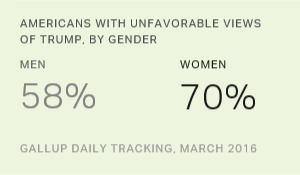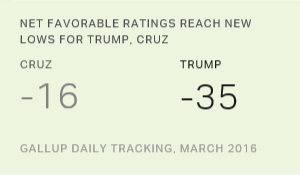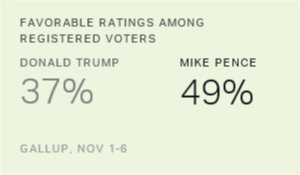Despite the verbal jousting going on between Hillary Clinton and Bernie Sanders as they travel in and around New York and Pennsylvania looking to sew up votes for those two states' forthcoming primaries, Democrats in general are very positive about both of their candidates. Republicans are less so.
Here are the latest data, based on interviews conducted March 31-April 6.
| Favorable% | Unfavorable% | ||||||||||||||||||||||||||||||||||||||||||||||||||||||||||||||||||||||||||||||||||||||||||||||||||
|---|---|---|---|---|---|---|---|---|---|---|---|---|---|---|---|---|---|---|---|---|---|---|---|---|---|---|---|---|---|---|---|---|---|---|---|---|---|---|---|---|---|---|---|---|---|---|---|---|---|---|---|---|---|---|---|---|---|---|---|---|---|---|---|---|---|---|---|---|---|---|---|---|---|---|---|---|---|---|---|---|---|---|---|---|---|---|---|---|---|---|---|---|---|---|---|---|---|---|---|
| Among Republicans/leaners | |||||||||||||||||||||||||||||||||||||||||||||||||||||||||||||||||||||||||||||||||||||||||||||||||||
| Donald Trump | 55 | 40 | |||||||||||||||||||||||||||||||||||||||||||||||||||||||||||||||||||||||||||||||||||||||||||||||||
| Ted Cruz | 52 | 38 | |||||||||||||||||||||||||||||||||||||||||||||||||||||||||||||||||||||||||||||||||||||||||||||||||
| Among Democrats/leaners | |||||||||||||||||||||||||||||||||||||||||||||||||||||||||||||||||||||||||||||||||||||||||||||||||||
| Hillary Clinton | 70 | 26 | |||||||||||||||||||||||||||||||||||||||||||||||||||||||||||||||||||||||||||||||||||||||||||||||||
| Bernie Sanders | 71 | 13 | |||||||||||||||||||||||||||||||||||||||||||||||||||||||||||||||||||||||||||||||||||||||||||||||||
| March 31-April 6, 2016 | |||||||||||||||||||||||||||||||||||||||||||||||||||||||||||||||||||||||||||||||||||||||||||||||||||
| Gallup poll | |||||||||||||||||||||||||||||||||||||||||||||||||||||||||||||||||||||||||||||||||||||||||||||||||||
Seven in 10 Democrats have a positive view of each of their party's two contenders. Clinton has a little more negative baggage, with a 26% unfavorable rating compared with Sanders' 13%. Sanders has a somewhat higher percentage responding "Never heard of/Don't have an opinion." But they are both well-liked.
This is significantly different from the Republican side, where the percentage of Republicans who like Donald Trump is 55% and those who like Ted Cruz is 52%. Plus, Trump's unfavorable rating among Republicans is 40%, while Cruz's is almost as high at 38%.
This results in a big gulf between how the Democratic candidates and the Republican candidates are seen by their party faithful. If we net out the favorable and unfavorable ratings, we find Sanders with a +58, Clinton with a +44, Trump with a +15 and Cruz with a +14.
We can look at how Democrats' views of their two candidates are shared by crossing the image data for both. (For this analysis, I've expanded the time frame to include all of March and April interviewing through April 6, to have a larger sample size.) What we find is that 51% of Democrats have a favorable view of both Clinton and Sanders. Thirty percent have a favorable opinion of one but an unfavorable opinion of the other -- 20% like Sanders but not Clinton, and 10% like Clinton but not Sanders. Importantly, only 3% have unfavorable opinions of both.
On the Republican side, there is much less love. Only 28% have a favorable view of both Trump and Cruz. Almost half of Republicans like one but not the other -- 23% have a favorable view of Trump but not Cruz, and the same percentage have a favorable view of Cruz but not Trump. Eleven percent have unfavorable opinions of both.
Additional analysis conducted using separate data shows that Democrats are more likely than Republicans -- especially Trump supporters -- to say they would vote for the "other" candidate should their preferred candidate lose the nomination.
Further, Republican enthusiasm has been waning over the past three months, and Republicans have become less likely to say the election process is working the way it should.
All of this doesn't bode well for Republicans in the general election.
Much can happen in a campaign, of course, and partisans and their leaders tend to make up after fighting over a nomination. Candidates who were busily criticizing each other often suddenly make nice after one of them comes out on top. There was no love lost between Lyndon Johnson and John F. Kennedy (and Kennedy's brother Robert) as Johnson and Kennedy fought for the 1960 Democratic nomination, but it didn't take long for JFK to turn around and ask LBJ to be his vice presidential running mate once the Massachusetts senator won the nomination. Ditto for Ronald Reagan and George H.W. Bush in 1980, and John Kerry and John Edwards in 2004. More recently, Clinton and Barack Obama went after each other in 2008 until Obama sewed up the nomination; he then turned around (later) and asked her to join his cabinet as secretary of state.
So it's possible that Republicans may become more positive about their candidate once he is known.
In March 2012, several of the Republican candidates were also not getting stellar ratings from their own partisans -- including 50% favorable for Ron Paul, and 56% favorable for Newt Gingrich. But the eventual nominee, Mitt Romney, had a 67% favorable rating at that point, much higher than either Trump's or Cruz's today. In 2008, in a March Gallup poll, John McCain came in with an 87% favorable rating from Republicans, and Obama had a 79% favorable rating from Democrats. Clinton back then had an 80% favorable rating among Democrats, a little higher than she is getting today -- but not by much.
Republicans to date are clearly more fractured and certainly less positive about the two leading candidates for their party's nomination than are Democrats. Carried forward, this means that the Republicans could have more of a challenge motivating voters in the fall. Something that could disrupt this pattern would be the entry of a current non-contender (like Paul Ryan) into the race, but this too would likely leave at least some supporters of the current candidates up in arms and upset.



